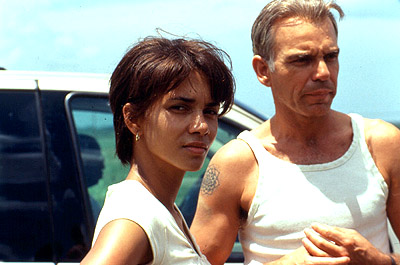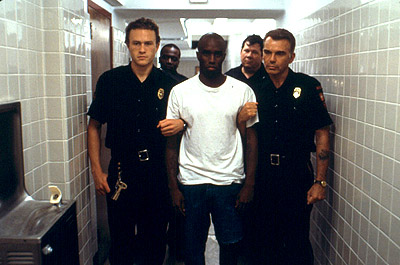

Dealing with one's inner feelings of ingrained racism is the subject of Monster's Ball, the new movie from Marc Forster (Everything Put Together, Loungers). At times, it is a difficult examination of a state of mind still present in some areas today. Monster's Ball takes place in the rural South. Hank Grotowski (Billy Bob Thornton, The Man Who Wasn't There, Bandits) is a second-generation prison guard. He lives at home with his father, a retired guard, and his son Sonny (Heath Ledger, The Patriot, A Knight's Tale), who works with him. They are preparing to execute Lawrence Musgrove (Sean Combs, Made, The Fighting Temptations). Lawrence's wife Leticia (Halle Berry, Swordfish, X-Men) lives nearby with their son Tyrell (Coronji Calhoun).
Emotionally, everybody in Monster's Ball is already dealing with many issues. Hank's father Buck (Peter Boyle, Doctor Dolittle, Species II) is a virulent racist. His beliefs passed on to Hank, who is less open about his beliefs. Leticia's relationship with Lawrence crumbled long ago, and she is doing her best to raise Tyrell, who is extremely obese. Forster and screenwriters Milo Addica and Will Rokos start bleakly, and have no qualms about making things even more depressing for Hank and Leticia. Similar, tragic events happen in both their lives. They eventually meet, and begin to take solace in each other. Leticia does not know that Hank worked at the prison Lawrence was at.
Hank and Leticia's relationship does not happen out of love, but out of desperation. Each feels burdened by the extreme tragedies that happen in their life. They feel isolated, with nobody to turn to for help. There is a fairly explicit love scene between the two (so much for Berry's aversion towards nudity) that illustrates their relationship. The scene is not erotic, it stems from a need for human touch. This leads to two impressive performances from Berry and Thornton. Hank and Leticia are two people with very little to hold onto, yet somehow they still manage to persevere. For Berry, Leticia is a woman slowly falling apart. As the movie progresses, Berry's emotional state crumbles further. Thornton is more animated than he was in The Man Who Wasn't There, but not by much. Hank is the type of person who internalizes his anger until it explodes, frequently directing it towards his son. Thornton provides Hank a calm exterior, with rage lurking near the surface.
The ugly racism that should be the center of the story arises sporadically before rearing its ugly head near the end of the movie. If Forster focused more on Hank's feelings, it would add much more depth to Monster's Ball. Hank is suffering an internal crisis; how to juggle his racist feelings versus his innate human decency (well, aside from the racism. Hank essentially ignores these feelings until somebody else forces them to the surface. Still, this should not detract from the strong performances by Thornton and Berry. Forster does keep things ambiguous, which is truer to what would happen in real life.